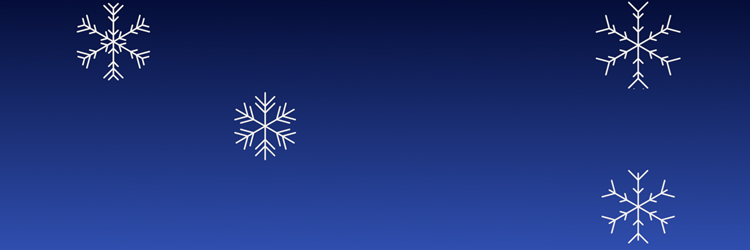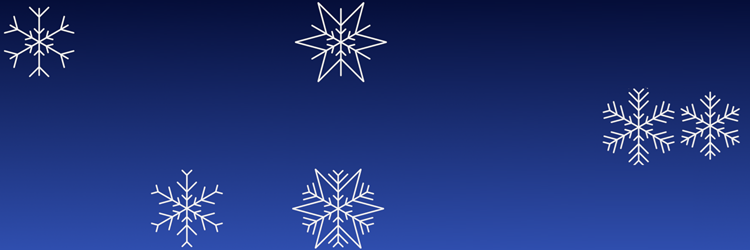What's happening? It's snowing. The snowflakes are wishing ...
... Happy HoidaysHolidays!
The snowflakes' positions:
Taking the image as a 10×3 grid, then reading each of the five 2×3 subgrids as Braille latter yields ⠉⠕⠇⠕⠗ or COLOR. Pranay found that one.
All snowflakes are different!
Apparently, "color" is a hint towards the next step, but the image isn't particularly colourful. It has a black-to-blue gradient in the background and white snowflakes. Sarsaparilla found that the snowflakes are of three different shades of white: They are a bright grey with all RGB components 242, 243 and 244 respectively. A keen eye won't help you here, you need the eyedropper tool to get the exact values.
The first group:
The snowflakes encode a message, but there's a slight difference in how the not-much-off-, medium-off- and quite-off-white flakes encode it.
Let's take the 244242/255 grey flakes first:
These flakes only have short crystal arms. They can be in seven possible positions. Together with the last digit (either hex or decimal) of the RGB values, that suggests the binary numbers 1110000, 1111001, 1101111, 1101100 and 1110011. (The most significant bit is near the centre of the flakes.)
In decimal, these values are 112, 121, 111, 108 and 115. These are ASCII codes in the lower-case letter region, namely for p, y, o, l and s.
The second group:
Now the 243/255 grey:
This time, we also have spikes of twice the normal length. We get the ternary numbers 10121, 01012, 02200 and 01020. In decimal: 97, 32, 72 and 33. In ASCII: a, _, H and !. (The second one is a space.)
The last group:
Now the 244/255 grey ones:
There are even larger spikes here. The RGB values end in 4. You know what that means: We get quaternary numbers 1020, 1300, 1221, 1210, 1201 and 1321. In decimal: 72, 112, 105, 100, 97 and 121. In ASCII: H, p, i, d, a and y.
Putting it all together:
The first flake is a capital letter. The last flake is a punctuation symbol. We can just read off the answer in the regular reading direction:
H a p p y _ H o l i d a y s !
Thanks
I haven't solved the first two steps. They were solved by Pranay and sarsparillasarsaparilla and later confirmed by Lukas. So thanks for that.



